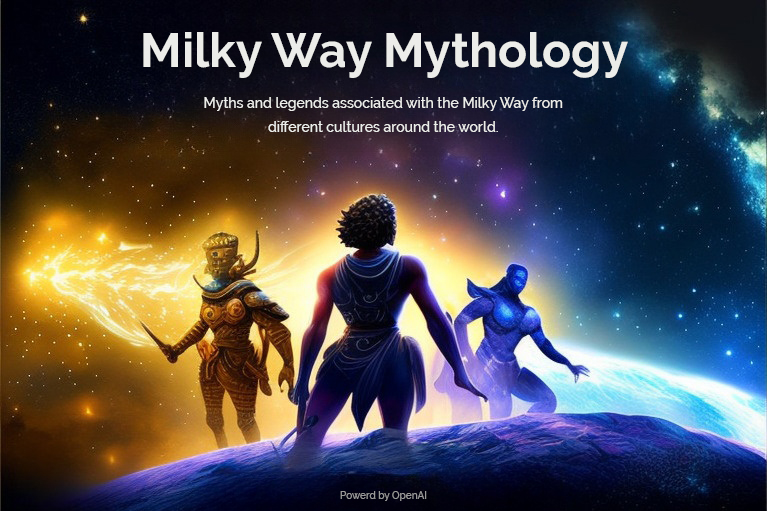Milky Way Mythology FAQ Bot

The Milky Way is a barred spiral galaxy that is home to our solar system. It has been a subject of fascination and wonder for cultures around the world for thousands of years. Many ancient civilizations saw the stars in the night sky and used their imaginations to create stories and legends about the celestial bodies. The purpose of this FAQ bot is to explore the history of Milky Way mythology and its significance in different cultures.
Visit the chatbot here.
Ancient Cultures and their Star Stories
- Greek mythology: In Greek mythology, the Milky Way was associated with the goddess Hera and was said to have been created when Hercules was suckled by his mother.
- Roman mythology: The Romans saw the Milky Way as the path of souls traveling to the afterlife.
- Native American mythology: Different Native American tribes had their own interpretations of the Milky Way, but many saw it as a pathway to the afterlife or a symbol of unity.
- African mythology: African mythology had several different stories about the Milky Way, including one that said the stars were the footprints of the gods.
Common Themes in Milky Way Mythologies
In many cultures, the Milky Way was seen as a connection to the divine, a pathway to the afterlife, or a symbol of unity. The stars in the night sky also provided an opportunity for ancient civilizations to explain natural phenomena, such as eclipses and comets, in a way that was accessible to the general population. The stories and legends about the Milky Way were also used in storytelling and cultural traditions, passing down important cultural beliefs from generation to generation.
Conclusion and Final Thoughts
In conclusion, the Milky Way has played a significant role in the cultural beliefs and traditions of ancient civilizations. From the Greeks to the Native Americans, the stars and their stories have provided a way for people to connect with the divine, explain the mysteries of the universe, and preserve their cultural heritage. While the scientific explanations for the Milky Way and its stars may be different from the ancient legends, the importance of these stories remains. They offer a glimpse into the beliefs and values of past cultures and provide a rich cultural legacy for future generations to explore and appreciate.
As we continue to explore the universe and unlock its secrets, it is important to preserve and share the cultural heritage of the Milky Way. The legends and stories surrounding the galaxy provide a unique perspective on the human experience and offer a valuable lesson in the power of imagination and wonder. Through this FAQ bot, we hope to share this legacy with a wider audience and inspire a new generation of star-gazers and myth-makers.
Visit the chatbot here.